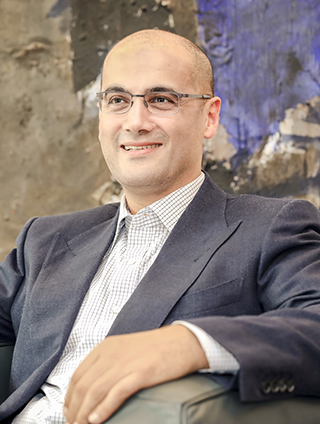In Discussion with Charlie Shamieh, FIAA, Chairman, Gen Re
By Reinsurance News
Reinsurance News, October 2021

Reinsurance News(RN): Speaking in the summer of 2021, we have to discuss the pandemic. How did COVID-19 impact the industry and Gen Re?

Charlie Shamieh, FIAA, Chairman, Gen Re
Charlie Shamieh(CS): With nearly 4.5 million deaths to August of 2021, the pandemic has upended our home life, our work life, our industry and partner gatherings and our financial results.
Our industry is now facing a number of global challenges and opportunities that were caused, or at least accelerated, by the pandemic.
The demand for our products is changing and, in most cases, intensifying. Society better understands today the critical role that insurers and reinsurers play in times of a public health crisis that threatens the health and financial security of households around the world. And with so much devastation from deaths around the world, human awareness of the vulnerability to sickness and disability is also at a peak.
The distribution and underwriting of our products are changing at an exponential pace. In nearly every market, we observe more accelerated/less invasive underwriting and the emergence of hybrid customer journeys, which make in-person meetings, the use of call centers, telehealth and digital interactions all part of the experience of acquiring and underwriting new customers.
RN: What’s the impact for the actuarial profession?
CS: The pricing of our products has also had to evolve. As risk capital providers, we owe it to our stakeholders, whether they be shareholders of public companies or policyholders of mutual companies, to ensure that our products are priced responsibly and sustainably. This includes the pricing of pandemic and other catastrophic risks like terrorism.
Although life insurers and reinsurers have historically prided themselves on their assessment of pandemic risks in academic textbooks and regulatory standards, few insurers and reinsurers adequately assessed and differentiated the risk of this modern day pandemic, where the ultimate burden has not only depended on the level of government funding available to support therapeutic and vaccine development and rollout, but also on other equally important factors, such as the level of vaccine hesitancy, the effectiveness of government public health orders and the spread of misinformation in the age of social media. None of this got covered in the actuarial curriculum up until now!
RN: What are your thoughts on big data and artificial intelligence?
CS: The re/insurance sector is a data-rich industry. The world of big data has provided numerous benefits to all of us—refining our marketing strategies, streamlining our operations, finessing our pricing, and improving the predictability of our underwriting. But with artificial intelligence and machine learning comes an added ethical responsibility for each of us, which is attracting increased regulatory scrutiny. That is the topic of fairness and indirect discrimination, which cuts across our product design, marketing, underwriting and pricing strategies. At Gen Re we explore these topics and share our insights with our clients.
RN: What else is on your mind when reflecting on the current business environment?
CS: The low interest rate environment and long duration guarantees embedded in many of our life insurance products have depressed the valuations of many publicly listed life and composite insurers. This has triggered an unprecedented wave of divestitures and so-called legacy reinsurance or asset intensive reinsurance transactions, which has attracted many new strategic investors into our industry—pension funds, private equity firms and family offices. While these investors have provided short-term solutions that have appeased shareholders disappointed in the returns from these legacy blocks in a low interest rate environment, it will take many years for this dynamic to play itself out. Indeed, some regulators fear the worst for policyholders in the new environment, which may encourage more illiquid and credit risky strategies at a time when some of the fiscal stimulus that underpinned global equity and credit markets—up until now—may be about to end or be severely curtailed. Time will tell whether these new entrants will represent a net positive or negative for our industry.
RN: What makes Gen Re different from these new entrants?
CS: As you know, Gen Re is part of the Berkshire Hathaway family of companies. I think the unique thing about us is that our shareholders do not measure our value using traditional insurance and reinsurance industry metrics of return on equity. Rather they look at the solidity of our long-term underwriting profits. We don’t celebrate the size of our investment gain in a particular quarter. We don’t even put a spotlight on that side of things. That gives the managers at Gen Re a tremendous amount of freedom to grow the franchise long-term. And we have ready access to more capital that could be put to work than any other insurance or reinsurance firm globally.
RN: Talking about long term, 2021 is a big anniversary year for Gen Re. What do you view as the most impressive and particular traits of Gen Re?
CS: Yes, this year marks Gen Re’s 100th anniversary, and in Europe we can even trace our roots back 175 years to the oldest reinsurer in the world—Cologne Re, founded in 1846.
This is a long and rich history, but through the ebbs and flows, Gen Re has always been known for our strong financial foundation and keeping our promises to clients, in good times and in bad. Also, I’d like to underline in particular the importance of our culture of excellence in underwriting. This is indeed the strongest culture of underwriting excellence I have experienced across each of the continents I have worked in, and it is my hope that we can share our insights directly and explicitly with our clients and have our clients challenge us where our views of a risk may not accord with theirs.
Though COVID-19 means we’ve had to postpone our plans in most places around the globe to celebrate our anniversary in person with our clients and business partners, we still very much hope to do so when the situation improves.
RN: Coming to a more personal question, how would you describe your personal leadership style?
CS: I don’t think I have one style. I am always laser-focused on getting the job done. And I love to work with a diverse team that can disagree productively with each other. I also love being challenged by my team and in return challenging them to achieve what may have seemed impossible at one point.
My former bosses often remarked that my teams have resembled the makeup of the United Nations. I am a huge advocate for diversity, equity, and inclusion. We need equal opportunities for our talent in the workplace. We also need more diversity in senior leadership roles in our industry. “Group think” does not produce the best possible decisions and results.
Statements of fact and opinions expressed herein are those of the individual authors and are not necessarily those of the Society of Actuaries, the newsletter editors, or the respective authors’ employers.
Charlie Shamieh, FIAA, is chairman of General Re Corporation, the Gen Re Group’s holding company, and has more than 35 years of industry experience across the Life & Health and Property & Casualty insurance and reinsurance industries in the U.S., Europe and Australasia.
